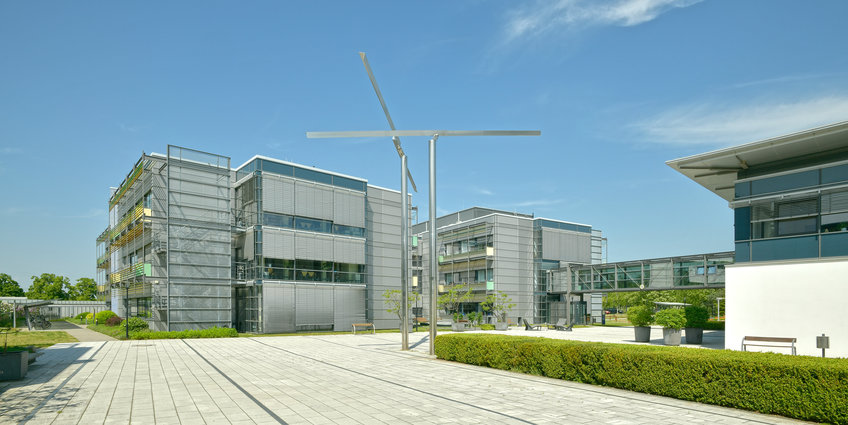
Portrait
The Max Planck Institute of Molecular Plant Physiology (MPI-MP) was founded in 1994, as one of 18 institutes on the territory of the former GDR. The founding director was Prof. Dr. Dr. h.c. Lothar Willmitzer, who is the director of one of the three departments which have been established since then. From originally only 16 employees the institute grew into a large institute, which now employs about 360 people from all over the world, who put their combined efforts into elucidating the secrets of plants.
In the first years the scientists performed their research in buildings on the campus of the University of Potsdam. In 1999 the construction activities on the Max Planck Campus at Potsdam Science Park were completed and the MPI-MP, together with the Max Planck Institute of Colloids and Interfaces and the Max Planck Institute for Gravitational Physics, moved into their new buildings. The three institutes share a central building with a lecture hall, seminar rooms, administration offices and a cafeteria. Apart from that, they are completely independent from each other.
Science and Research
Since the institute was founded the main emphasis of the institute has shifted from the analysis of central metabolic pathways combined with the analysis of gene function to the development and implementation of phenotyping technologies and system approaches. This Systems Biology approach is driven by a close interaction between experimental and computational scientists who work side by side in the institute.
The MPI-MP investigates metabolic and molecular processes in cells, tissues, organs and whole plants. The overall goal is to understand how growth and metabolism are regulated, to learn how they respond to environmental factors, and to unravel genetic factors that underlie these processes and responses. To achieve this, it is not only necessary to understand the functions of individual genes, but also the molecular details of individual processes like the uptake of nutrients, the structure, storage, transport and mobilisation of plant components, and the regulation of individual processes. It is also essential to learn how these different processes interact in networks, and to develop approaches that provide quantitative information and a predictive understanding of these complex networks.
In then department Root Biology and Symbiosis led by Prof. Dr. Caroline Gutjahr, central research questions are whether and how the establishment of the symbiosis between plants and mycorrhiza fungi is influenced by environmental factors and which molecules play a crucial role in this process. Professor Gutjahr not only studies the molecular processes in plants, but also the fungi, which have hardly been studied in detail. Furthermore, the department is looking into whether the molecular knowledge can be used to breed mycorrhiza-optimized crops that could contribute to sustainability in agriculture.
In the department "Organelle Biology, Biotechnology and Molecular Ecophysiology", Prof. Ralph Bock and his research team deals with the physiology and genetics of cell organelles, such as plastids and mitochondria, as well as the molecular mechanisms of the evolution of plant genomes. The spectrum of methods includes techniques from molecular biology, genetics, physiology, biochemistry, biophysics and bioinformatics.
The Institute also focuses on research into the seed formation of flowering plants. The department "Plant Reproductive Biology and Epigenetics" investigates how epigenetic processes are involved in plant reproduction. This primarily concerns the control of the initiation of seed formation and the exchange of signals within the seed, as well as the elucidation of the mechanisms of seed-based hybridization barriers that prevent the crossing of different species and thus establish species boundaries. Methods of microscopy, genetics, genomics, epigenomics and bioinformatics are mainly used for this purpose.
More information about the research interests of the various groups can be found in the Research section of this website.